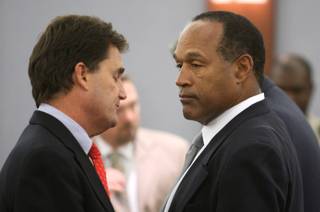Thursday, Dec. 24, 2009 | 12:50 p.m.
CARSON CITY — The Nevada Supreme Court ruled that jury questionnaires are public information, and the media should have had access to them during O.J. Simpson’s trial.
The court set the guidelines for district judges to follow in the future if they think the release of questionnaires would affect the right of the criminal defendant to a fair trial.
The court, in a decision written by Chief Justice James Hardesty, overturned the ruling of District Judge Jackie Glass, who refused requests by the Associated Press and Las Vegas Review-Journal to access blank and completed questionnaires in the Las Vegas trial of O.J. Simpson and his co-defendant Charles Stewart.
Both were convicted of robbery, first-degree kidnapping and using a deadly weapon. But it outlines how these requests from the news media should be handled in future cases.
The press sought a copy of a blank questionnaire before the attorneys started to publicly question the jurors to determine if they could reach a fair verdict. After the jury was seated, the two news media sought the questionnaires that had been completed by the jurors.
Judge Glass refused the request for blank questionnaires because she was concerned it would taint the jury and that potential jurors would tailor their answers to better position themselves to get on the jury.
She refused to release completed documents on the grounds she promised the jurors their information would be kept confidential.
The Supreme Court’s decision said the U.S. Constitution does not explicitly state that the press or public have a right to access criminal trials but “the presumption of an open court is firmly rooted in American jurisprudence.”
Hardesty wrote, “Public access inherently promotes public scrutiny of the judicial process, which enhances both the fairness of criminal proceedings and the public confidence in the criminal justice system.”
The court said the use of questionnaires is “merely a part of the overall voir dire process subject to public access and the same qualified limitations as applied to oral voir dire,.” the public questioning of the jurors.
The court said the press and the public have a right to seek limited intervention in a criminal case to argue constitutional claims.
Hardesty said a district court may refuse access to juror questionnaires only after it makes specific findings that the defendant would be deprived of a fair trial and whether alternatives to total suppression would protect the right of the accused.
In the Simpson case, the court said: “The district court failed to make explicit findings that indicated the disclosure of the juror questionnaires would have created a substantial probability of infringement of the defendants’ right to a fair trial.”
The court said the concern of Judge Glass that potential jurors would review the questionnaires and give their answers to better position themselves for a chance on the jury is “based on unsupported conjecture.”
The decision said it declines “to adopt a policy of suspicion and mistrust in this case by determining that 12 citizens could not be found among a large pool of potential jurors who would faithfully perform their jury service.”
After the trial Judge Glass released redacted versions of the completed questionnaires, but that does not cure the original decision against disclosure by the district judge, said the court.
If a juror feels the questions posed on the pre-trial questionnaire are deeply sensitive and personal in nature, he or she may speak to the judge with attorneys present and on the record to avoid public embarrassment.
“By requiring jurors to make an affirmative request, we determine that the procedure would effectively reduce the risk of unnecessary closure of the voir dire proceedings, as the trial judge could consider whether there is a factual basis for the juror’s privacy right,” said Hardesty.
Justice Kristina Pickering voluntarily excused her herself from sitting on this case.


Join the Discussion:
Check this out for a full explanation of our conversion to the LiveFyre commenting system and instructions on how to sign up for an account.
Full comments policy